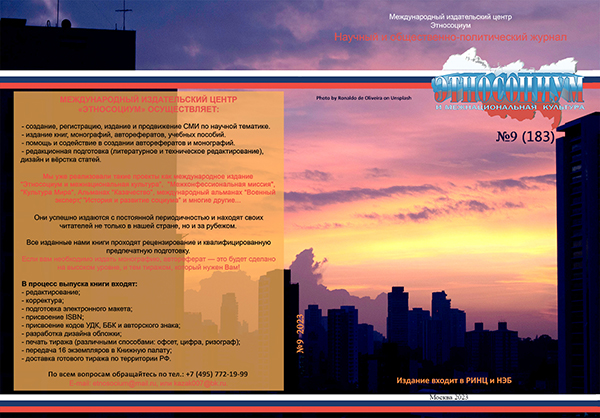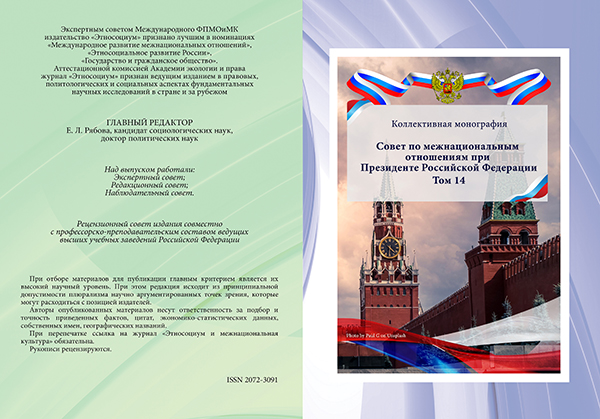

Content
|
COUNCIL OF INTERNATIONAL RELATIONSHIP
|
|
|
Mikhaylenko A.N. Strategic partnership and alliance in international relations
|
9
|
|
CURRENT PROBLEMS OF MODERN SOCIETY
|
|
|
Mironova T.A., Ternovaya L.O. Changes in students' communication practices in conditions of free movement of knowledge
|
23
|
|
REGIONAL STUDIES
|
|
|
Tamakov L.N. International relations of the Republic of Crimea: current state and prospects of development
|
33
|
|
INTERNATIONAL RELATIONSHIPS
|
|
|
Hasanov Elmin Aghamusa oglu The reaction of international humanitarian law to asymmetric (hybrid) warfare
|
45
|
|
Rasskazova I.N., Murodov I.E. Fake as a tool for spreading viral content in the information field of the Republic of Tajikistan
|
63
|
|
Zhu Xiang-yu Sino-Russian educational cooperation and communication in the framework of SCO
|
73
|
|
Iovashevich Zhivan Prospects for Russian-Serbian relations in the context of the economic war between the collective West and Russia
|
82
|
|
Liu Yuanzhi, Chunyu Gao A study on the application of task-driven teaching method in computer teaching in Chinese colleges and Universities
|
91
|
|
Gorchakova L.V. About the French Diplomatic Service
|
98
|
|
SOCIOLOGY
|
|
|
Fidarova K.K., Kalabekova S.V., Amirkhanyan V.G. Formation of tolerance in society: conditions and factors
|
105
|
|
Trukhin A.S., Ignatov M.A., Lesovaya S.L. Аbout the implementation of the program of social and economic reforms in Iraq’s Kurdistan
|
115
|
|
Wei Jinlong Social structure management and core theory
|
121
|
|
JOURNALISM
|
|
|
Li Zheyu Tendencies of journalism development in the XXI century
|
127
|
|
Lei Xin, Zhao JiongChen Coverage of the environmental issues on the pages of the foreign and Russian mass media
|
131
|
|
Abstracts
|
137
|
|
Authors
|
149
|
|
Requirements to materials submitted to the international publishing house "Etnosocium"
|
153
|
At present, the world is developing a new world order, which is the reason for the aggravation of the international situation. In such periods, the need for reliable strategic partners and allies increases. Strategic partnership and alliance are the two highest levels of international relations. Strategic partnership consists in maintaining long-term mutually beneficial relations between countries in a wide range of cooperation in accordance with their national interests. In the further development of relations between countries, they move to the level of alliance, at which the coordination of their actions on key issues of our time increases, the obligations of the parties are legally more clearly fixed, the number of areas of interaction increases, and cooperation in the military and security spheres deepens. Allies expect each other to display such qualities as trust, reliability, flexibility, predictability.
Keywords: EAEU, CSTO, NATO, BRICS, China, new world order, strategic partnership, alliance, policy coherence, reliability, trust, friend-shoring.
The article considers a modern assessment of the transfer of knowledge as freedom of movement, reflected in the works of Russian and foreign experts. Understanding the exchange of knowledge as a flow requires a more serious scientific study of the problem of knowledge management. At the same time, along with the importance of theoretical developments, the analysis of processes that indicate changes in modern communication practices under the influence of the expansion of the flow of knowledge is becoming increasingly practical. Particularly relevant are studies that touch upon the problems of higher education, the formation of intellectual capital and the social activity of students in the transition to a new quality of knowledge exchange.
Keywords: knowledge transfer, flow, innovation, university system, organization management, intellectual capital, communication practices.
The article considers the status of the Republic of Crimea in international law, analyses the experience of unrecognized states in their recognition by foreign countries, focuses on the socio-economic aspects of the peninsula's development, the problems of interaction between the Republic of Crimea and foreign countries, and also provides examples of successful overcoming international isolation by other jurisdictions. The article outlines proposals for the further development of Crimea, outlines the possibilities of using various tools to promote its international status.
Keywords: Republic of Crimea, foreign economic activity, external relations, unrecognised states, tourism, public diplomacy, transit potential.
The article examines the relationship between international humanitarian law and asymmetric warfare. For this purpose, the nature and content of asymmetric war, the impact of asymmetry in the application of military force on the legitimacy of the war and the warring parties, and the interests arising from the application of international humanitarian law are extensively analyzed.
Keywords: international humanitarian law, asymmetric war, jus ad bellum, jus in bello, jus cogens.
In the harsh conditions of the increasing quantity and quality of hybrid threats to the socio-economic system of international relations, fake news is a serious problem that can lead to negative consequences for modern security. In the 21st century, fakes are used as a tool by geopolitical adversaries to hijack the information agenda with the aim of destructive, viral, and aggressive manipulative influence on people. Therefore, protecting society from the destructive impact of fake information becomes of crucial importance.
Keywords: information field, counteraction strategies, fake news, information, credibility, information literacy, emotional reaction.
This article examines the issue of Chinese-Russian educational cooperation within the SCO. The study shows that China and Russia, as the world's largest powers and leading countries of the Shanghai Cooperation Organization, attach great importance to the development of education. Cooperation in this area continues to develop and function effectively.
Keywords: China, Russia, educational cooperation and communication, SCO University.
Russian-Serbian relations throughout history have demonstrated an enviable resilience to various kinds of challenges. At the moment Serbia among the "friendly states" is the most subject to pressure from the collective West in joining the anti-Russian sanctions. The geographic and economic dependence of Serbia on the collective West is forcing the Serbian leadership to choose more carefully the formats of cooperation with Russia, taking into account such risks as the escalation of the conflict in Kosovo and the revision of the status of the Republika Srpska, access restriction to the EU market, secondary sanctions imposition, investments and crediting stoppage.
Keywords: Serbia, Russia, sanctions, export restrictions, Republika Srpska, Kosovo, EU, USA, NATO, Balkans.
The article centers on the discussion of computer education under the task-driven teaching method, and analyzes the significance of the application of the teaching method and the application strategy in detail. In contemporary society, the information technology field is constantly developing, and computer education has gradually attracted attention from all walks of life. In order to ensure the learning quality of college students' computer courses, Chinese college computer teachers innovate their teaching methods and actively carry out task-driven teaching activities to ensure the quality of college students' participation in teaching, and the quality of teachers' computer lectures is also significantly improved.
Keywords: task-driven approach, computers, university.
French diplomats have been qualified diplomatic experts for several centuries. They are an example to all other diplomatic services of major European powers. The French Foreign Ministry is a huge, well–coordinated mechanism where all structures responsibly perform their tasks.
Keywords: France, foreign policy, Ministry of Foreign Affairs of France, general directorates, ministers-delegates, diplomatic officials.
In this article, the author shows that the problems of the phenomenon of tolerance are among the quite relevant and popular topics. Reveals the conditions and factors of tolerance formation in society. It shows that the strengthening of the influence of tolerance expands the powers of civil society. The author expresses his concern that these changes have become the basis for the future deformation of tolerance. After all, up to a certain stage in the development of tolerance, the expansion of its boundaries was useful for society, justified, but there came a time when the boundaries of tolerance, the applicability of this value were expanded to such an extent that society faced alienation and deformation of tolerance. Tolerance has become identified with a certain ideal of political and legal structure, losing its identity and identity as a value. Russian philosophers have made a significant contribution to the development of the theory of tolerance and the existence of the category of tolerance in Russian culture, however, despite this, the author does not forget about the significant contribution of Russian philosophers to the development of the theory of tolerance.
Keywords: tolerance, tension, stability, mass culture, clip consciousness, clip culture, social stability, globalization.
This article reveals the content of the program of social and economic reforms in Iraqi Kurdistan, which provides for the optimization of relations with the federal government, consolidation and coordination of political forces, renewal of the state apparatus at the federal and regional levels, introduction of appropriate amendments to the Constitution, economical use of budgetary funds, intensification of the fight against smuggling of oil and oil products, intensification of work on the implementation of the all-Iraqi "national map" program. The main goal of the Program is to reduce bureaucratic burden, make life easier for citizens.
Keywords: reforms, program, national map, Kurdish Autonomous Republic (KAR), state apparatus, political parties.
The article is devoted to the management of the social structure of society in the light of the theoretical provisions of the core theory, which reflects the relationship between the political, economic and socio-cultural elements of the center and periphery of civilizational development. The content of the concepts of "society," "structure of society," "stratification of society," "management" in the context of the patterns of development of society and civilization are disclosed. It has been shown that the mechanism for forming the structure of society at certain historical stages of its development is the civilizational core, which forms the core-periphery dyad, which ensures the unity and structuring of the life of various regional, social and national communities. The relationship between the relations of the center and periphery with the structure of social stratification is shown on the example of the functioning of a patrimonial society, societies of imperial and imperial-feudal types.
Keywords: society, structure of society, sociocultural stratification, management, civilizational core, center, periphery.
This article is devoted to the peculiarities of journalism development in the modern epoch. Journalism is a complex and multifaceted phenomenon that cannot be considered as synonym to the mass media/ It can be proved looking at the path of journalism development for the past twenty years. The author of the article deals with such problems of journalism of the twentieth century as journalist's activity in modern conditions, multimedia and convergence of modern journalism, peculiarities of content creation.
Keywords: journalism, mass media, digital media, Internet, interactivity, convergence.
This article analyzes the publications of foreign and Russian mass media aimed at covering environmental problems of the modern age. Having defined the concept of “environmental journalism” and having touched upon a question of its origin, the author of the article determines the range of problems concerning the planet's ecology reflected in the articles of the Internet media. While researching the author of the article comes to the conclusion that foreign mass media mainly deal with environmental problems on a global scale, such as climate change, global warming, deforestation of tropical forests, natural disasters, etc. Russian media, as a rule, focus on environmental inner problems. Russian journalists worry about water pollution in Russia more than in other countries and other continents. However, as the author of the article notes, both foreign and Russian media pay insufficient attention to the coverage of environmental problems.
Keywords: environmental journalism, media, Internet, environmental disaster, climate change, water pollution.